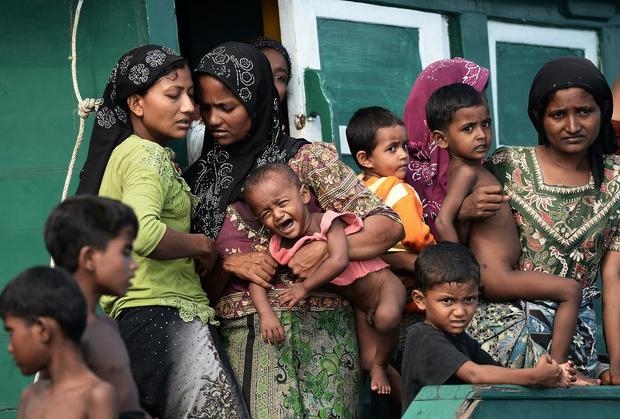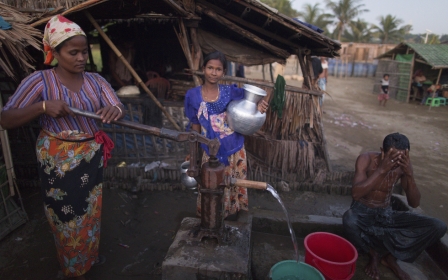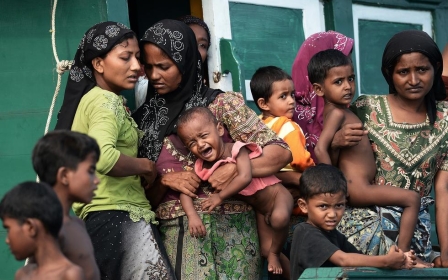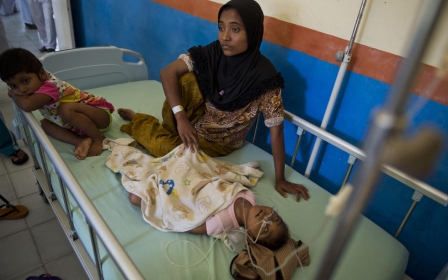Rohingya crisis: Muslim nations put pressure on Myanmar

By M Jegathesan
The world's main pan-Islamic body is expected to pile pressure on Myanmar over a bloody crackdown on Rohingya Muslims, when it meets for a special session in Kuala Lumpur on Thursday.
Almost 70,000 Rohingya have fled the northern part of Rakhine state since October when the Myanmar army launched "clearance operations" allegedly to root out rebels accused of deadly raids on police border posts.
Arriving in neighbouring Bangladesh, the displaced Rohingya have recounted allegations of widespread military abuse including rape, extrajudicial killings and the burning of villages.
Treatment of the Rohingya, a stateless group denied citizenship in Myanmar and reviled as illegal immigrants by the majority Buddhist population, has become a lightning rod for anger across the Muslim world.
Diplomats from the 56-member Organisation of Islamic Cooperation (OIC) will join Thursday's special session to debate the issue.
Malaysian Prime Minister Najib Razak has taken a lead role in condemning the Myanmar crackdown.
Analysts say that it is at least in part because of a desire to burnish his image after a damaging graft scandal at home.
On Wednesday, Malaysia's Foreign Minister Anifa Aman upped the ante ahead of the meeting, calling for "unimpeded access" for humanitarian aid to reach the Rohingya.
He is expected to spearhead an effort within the OIC to raise cash and open aid routes into areas in western Rakhine state, which remain locked down.
"The OIC meeting is expected to call on the Myanmar government to help end the violence against the Rohingya Muslims," a Southeast Asian diplomat familiar with the case told AFP.
"The OIC foreign ministers are also expected to provide assistance in cash or kind for the Rohingya."
Buddhist-majority Myanmar refuses to recognise the Rohingya as one of the country's ethnic minorities.
Instead, it describes them pejoratively as Bengalis - or illegal immigrants from neighbouring Bangladesh - even though many have lived in Myanmar for generations.
Suu Kyi criticised
The latest chapter of a crisis that has festered since riots broke out in Rakhine in 2012 has once more drawn in regional neighbours.
Bangladesh is struggling to cope with the fresh arrivals, while Malaysia has for years housed thousands of Rohingya refugees. Many arrived during a 2015 exodus that saw boatloads of Rohingya stranded at sea.
The plight of the Rohingya has put Myanmar's democracy champion and de facto leader Aung San Suu Kyi under immense international pressure.
She has been criticised for failing to speak up robustly in defence of the Rohingya, while analysts say the latest crackdown suggests she lacks leverage over Myanmar's still powerful military.
Premier Najib's intervention in the crisis has angered Myanmar, which considers the violence in Rakhine state an internal matter.
Najib's championing of the Rohingya is likely to be well received in the rural Malay heartlands.
The premier has been buffeted by allegations that he took part in the looting of billions of dollars of public cash through state fund 1MDB.
Both he and the fund vehemently deny the allegations.
New MEE newsletter: Jerusalem Dispatch
Sign up to get the latest insights and analysis on Israel-Palestine, alongside Turkey Unpacked and other MEE newsletters
Middle East Eye delivers independent and unrivalled coverage and analysis of the Middle East, North Africa and beyond. To learn more about republishing this content and the associated fees, please fill out this form. More about MEE can be found here.




